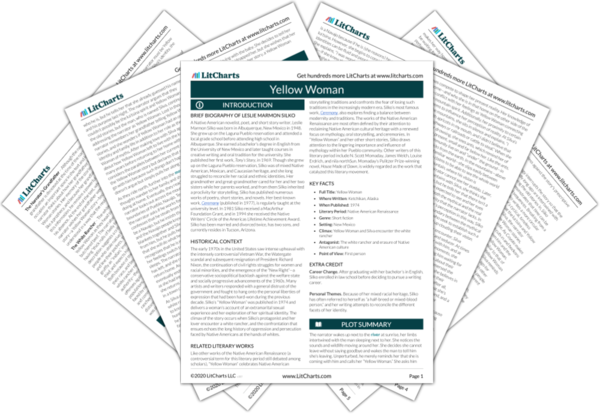The narrator wakes up next to the river at sunrise, her limbs intertwined with the man sleeping next to her. She notices the sounds and wildlife moving around her. She decides she cannot leave without saying goodbye and wakes the man to tell him she’s leaving. Unperturbed, he merely reminds her that she is coming with him and calls her “Yellow Woman.” She asks him who he is, but he tells her that she already guessed his name and his purpose last night. The narrator argues that they couldn’t possibly be the ka’tsina spirit and Yellow Woman from the old stories, but the man, who is named Silva, continues addressing the narrator as Yellow Woman. Lost in thought, the narrator remembers her grandfather telling Yellow Woman stories, and she wonders if Yellow Woman had an ordinary identity and family life in addition to her role as the Yellow Woman of myths. After making love with Silva again, she thinks about how Yellow Woman left to live with the ka’tsina spirit for many years before returning to her home with twin boys. She considers the parallels between her current experiences and the Yellow Woman story but declares that she does not have to go with him because such things don't happen anymore. Silva doesn't argue but simply pulls her along with him, and she goes.
As they ride north, further into the mountains, the narrator’s thoughts wander to her family and she wonders what they are doing at home. Eventually, they reach Silva’s home, and the narrator looks out across the mountain. Silva points out the boundaries of Pueblo, Navajo, Texan, and Mexican lands. When the narrator asks if he works for the cattle ranches, Silva confesses that he steals from them. She tells him that he must be a Navajo, but he insists that she already knows who he is, and the Navajo people know him, too. They climb under the blankets together and Silva kisses her face. She turns away from him, but he pulls her back, becoming forceful, and tells her that she will do what he wants. Yellow Woman feels afraid and recognizes that he is more powerful than she is. Later though, her feelings switch to tenderness, and she kisses his face as he sleeps. The narrator wakes the next morning to find that Silva has left, and she recognizes this as an opportunity for her to return home. As she wanders through the pine trees, she eventually ends up back at Silva’s house instead of going home as she had intended. Silva is dressing an animal carcass when she returns and asks if she wants to accompany him to sell meat in a town called Marquez.

As Silva and the narrator make their way down the mountain, a white rancher rides up to Silva and the narrator and demands to know where Silva got the fresh meat. Silva claims he was hunting, and the rancher accuses him of being the cattle thief he has been looking for. The narrator describes the rancher as fat, sweaty, and smelly. Silva turns to the narrator and instructs her to ride back up the mountain. As the narrator turns to leave, she sees Silva’s hand on his rifle. She rides away as fast as she can. She thinks she hears four gunshots. When she spots the river, she leaves the horse and follows the river toward the pueblo. She stops to rest and thinks about Silva, feeling sad that she left him but still confused about him. She tells herself that he will be waiting for her again one day. Walking back into the village, the narrator reaches the door of her house and is greeted with the sounds and smells of home. Everything seems normal inside, with her mother and grandmother fixing Jell-O and her husband playing with the baby. She decides to tell her family that a Navajo had kidnapped her, but she wishes that her grandfather was around to hear her story, a Yellow Woman story.







